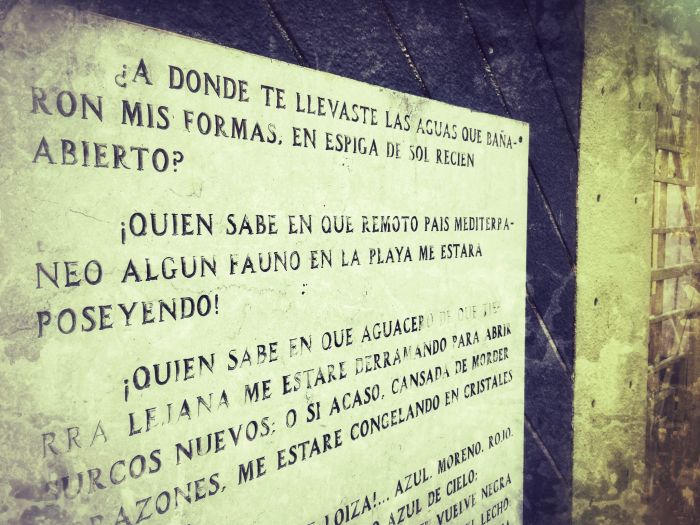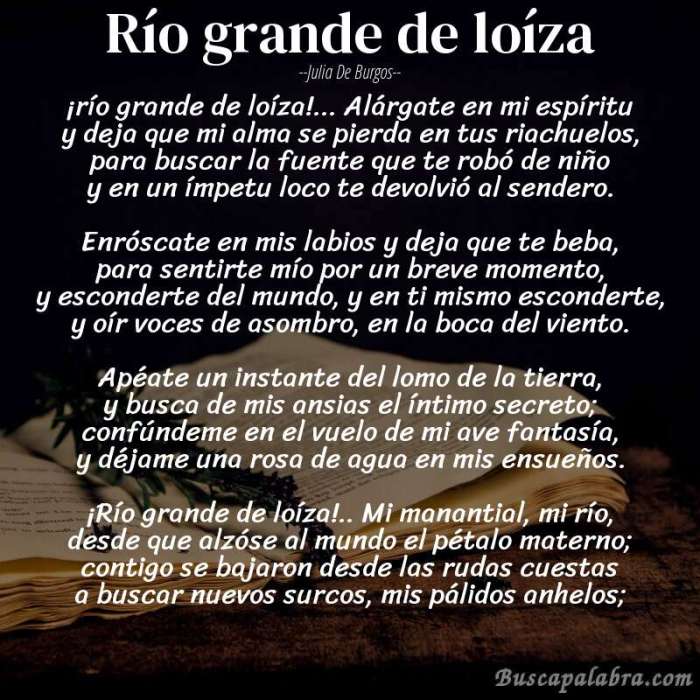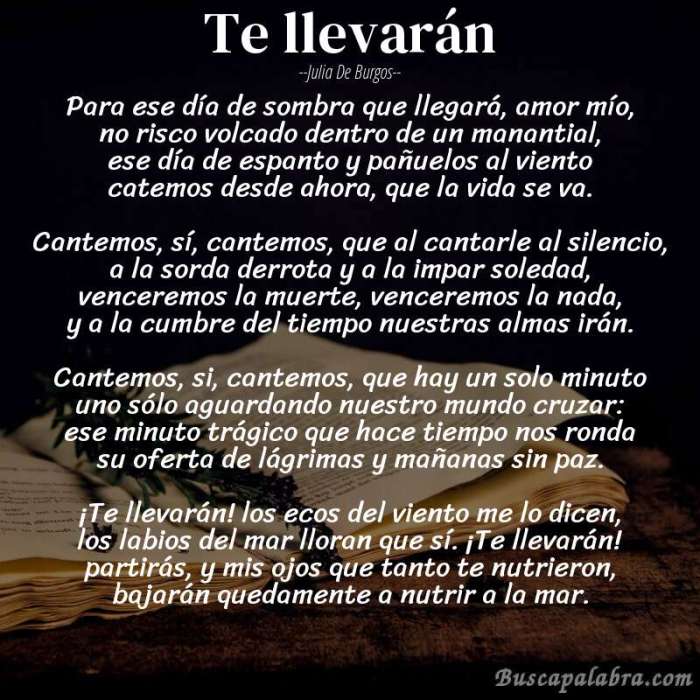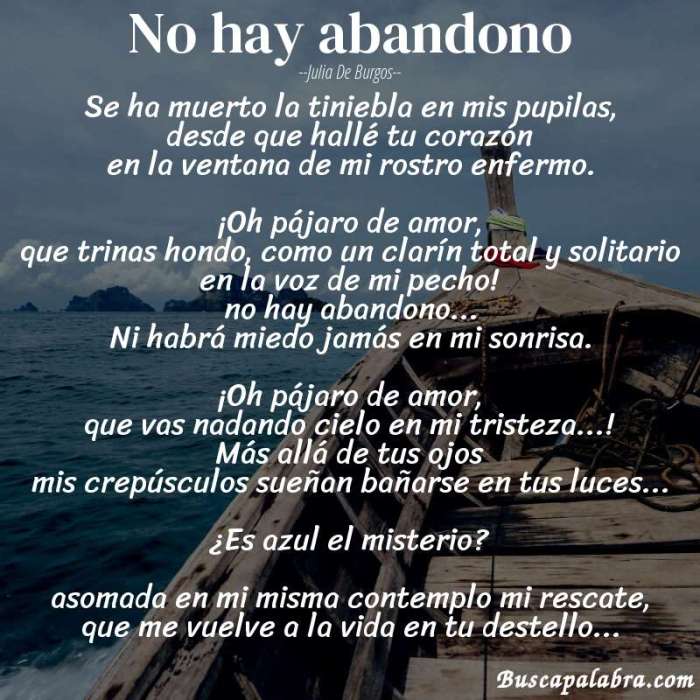A julia de burgos poema – A Julia de Burgos’ Poema is a timeless masterpiece that has captivated readers for generations. This captivating poem explores themes of identity, exile, and longing through the lens of a Puerto Rican woman’s experience. Delve into its structure, symbolism, and enduring legacy to uncover the profound impact it has had on Puerto Rican literature and beyond.
Poem’s Context
Julia de Burgos’ “Poema” is a powerful and poignant work that reflects the historical and cultural context of Puerto Rico in the early 20th century. Burgos, a prominent Puerto Rican poet, was a vocal advocate for social justice and women’s rights, and her writing often explored themes of identity, oppression, and liberation.
Historical Context
Puerto Rico was under Spanish colonial rule for over four centuries, and during this time, the island’s culture and economy were heavily influenced by Spain. In the late 19th century, the United States emerged as a major power in the Caribbean, and in 1898, the Spanish-American War resulted in Puerto Rico becoming a US territory.
This political shift brought significant changes to the island, including the imposition of English as the official language and the introduction of American cultural norms.
The evocative verses of Julia de Burgos’s poem paint a vivid tapestry of emotions, leaving a lasting impression on the reader’s mind. Her words have a timeless quality that resonates across generations. Incidentally, if you’re interested in delving into the intricacies of dentistry, you might find the types of clasps in removable partial dentures to be an informative read.
Returning to Julia de Burgos’s masterpiece, her poignant exploration of love, loss, and resilience continues to captivate and inspire.
Julia de Burgos’ Life and Experiences
Julia de Burgos was born in Carolina, Puerto Rico, in 1914. She grew up in a poor family and had limited access to education. Despite these challenges, she developed a passion for writing at a young age. Burgos’ experiences as a woman of color in a patriarchal society shaped her worldview and influenced the themes she explored in her poetry.
Poem’s Structure and Form

Julia de Burgos’s poem “Yo misma fui mi ruta” is a free verse poem, meaning it does not follow a specific rhyme scheme or meter. The poem consists of 10 stanzas, with varying line lengths. The language is simple and direct, with a focus on the poet’s personal experiences and emotions.
Rhyme Scheme
The poem does not have a consistent rhyme scheme. However, there are a few instances of rhyme, such as in the first stanza, where the lines “fui mi propia ruta” and “mi propio destino” rhyme.
Literary Devices
Burgos uses a variety of literary devices in the poem, including metaphors, similes, and imagery. For example, in the first stanza, she compares herself to a “star that wandered alone.” This metaphor suggests that she is unique and independent, and that she has had to forge her own path in life.
Poem’s Themes

Julia de Burgos’s “Poema” explores several significant themes, including identity, exile, and longing.
Identity
Burgos grapples with her sense of self as a Puerto Rican woman living in the United States. She questions her place in both societies and struggles to reconcile her two cultures.
Exile
The poem captures the pain and loneliness of exile. Burgos feels alienated from both her homeland and her adopted country. She yearns for a sense of belonging and connection.
Longing, A julia de burgos poema
Throughout the poem, Burgos expresses a deep longing for her homeland and her lost past. She dreams of returning to Puerto Rico and reclaiming her identity.
Poem’s Symbolism: A Julia De Burgos Poema

The poem “Poema” by Julia de Burgos is rich in symbolism, with several elements representing deeper meanings and emotions. The sea, the wind, and the stars are prominent symbols that contribute significantly to the poem’s overall significance.
The Sea
The sea in the poem represents the vastness and depth of human emotions. It symbolizes the speaker’s inner turmoil and the overwhelming feelings of longing and desire that she experiences. The sea’s relentless waves and currents mirror the speaker’s fluctuating emotions, while its depths suggest the hidden complexities and mysteries within her.
The Wind
The wind in the poem represents the forces that shape and influence the speaker’s life. It symbolizes the external pressures and challenges that she faces, as well as the internal struggles that she must navigate. The wind’s capricious nature reflects the unpredictable and often harsh realities of life, while its ability to carry and disperse seeds suggests the potential for growth and renewal.
The Stars
The stars in the poem represent the speaker’s dreams and aspirations. They symbolize the distant and elusive goals that she strives for, as well as the guiding lights that provide her with hope and direction. The stars’ twinkling brilliance represents the speaker’s resilience and determination, while their vast numbers suggest the infinite possibilities that lie ahead.
Poem’s Impact and Legacy

Julia de Burgos’ “Poema” has had a profound impact on Puerto Rican literature and culture. It is considered one of the most important poems of the 20th century and continues to resonate with readers today.
The poem’s exploration of themes such as identity, oppression, and liberation has made it a powerful symbol of Puerto Rican struggles and aspirations. It has been used in political and social movements, and has inspired countless other works of art.
Poem’s Impact on Puerto Rican Literature
Burgos’ “Poema” was a groundbreaking work that challenged traditional notions of femininity and identity in Puerto Rican literature. It introduced a new voice to the literary landscape, one that was both personal and political.
The poem’s use of free verse and its frank exploration of female sexuality were particularly radical for the time. It helped to pave the way for a new generation of Puerto Rican writers who were not afraid to express their own voices.
Poem’s Legacy Today
“Poema” continues to be a source of inspiration for Puerto Rican writers and artists today. It is a reminder of the struggles and triumphs of the Puerto Rican people, and it continues to inspire hope and liberation.
The poem is also a testament to the power of poetry to speak to the human condition. It is a poem that transcends its time and place, and it continues to resonate with readers of all backgrounds.
Poem’s Literary Devices

Julia de Burgos’s poem employs various literary devices to convey its powerful message and evoke vivid imagery in the reader’s mind.
Imagery
- Sight:“green stems,” “fragrant gardenias,” “pearly dawn”
- Sound:“song of the coqui,” “humming of bees”
- Smell:“scent of the roses”
- Touch:“soft petals,” “gentle breeze”
These sensory details create a vibrant and immersive experience, transporting the reader into the poem’s lush and evocative setting.
Metaphors
- “Your eyes are two green stems / That sprout from the depths of the earth”
- “Your breath is the fragrant gardenia / That perfumes the night”
These metaphors equate the woman’s physical attributes with natural elements, highlighting her beauty and connection to the natural world.
Personification
- “The dawn kisses the mountaintops”
- “The bees hum their sweet song”
By giving human qualities to non-human entities, the poem animates the natural world, creating a sense of wonder and enchantment.
Poem’s Historical Significance
Julia de Burgos’s “Poema” holds immense historical significance within the context of Puerto Rican history and the island’s struggle for independence. Composed during a period of political and social unrest, the poem powerfully reflects the sentiments of the Puerto Rican people and their yearning for freedom and self-determination.
Puerto Rican Independence Movement
Puerto Rico, a U.S. colony since 1898, has long grappled with the question of independence. “Poema” emerged amidst this struggle, echoing the growing desire for sovereignty among Puerto Ricans. Burgos’s words became a rallying cry for the independence movement, inspiring countless individuals to fight for their nation’s liberation.
Social and Political Climate
The poem also captured the complex social and political climate of Puerto Rico during the early 20th century. It exposed the rampant discrimination, poverty, and oppression faced by the Puerto Rican people under U.S. rule. Burgos’s powerful imagery and poignant language laid bare the injustices and inequalities that plagued her homeland, igniting a sense of urgency for change.
FAQs
What is the significance of the sea in the poem?
The sea represents both a physical and emotional barrier, symbolizing the distance between the speaker and her homeland and the longing for connection.
How does the poem explore the theme of identity?
The poem delves into the complexities of identity, particularly the struggle to reconcile one’s Puerto Rican heritage with the dominant American culture.